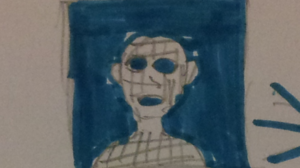Click on the Image to view my Artifact
If the above link doesn’t play in your browser you can find the same video on you tube here
References
All photos and screen shots were taken by me and are available under [CC-BY-SA-2.0]
The 2 drawings were created by Edward Fox-Gliddon (my 9 year old son) and are also licensed under [CC-BY-SA-2.0] you must attribute both him and his comic company “Air Balloon Comics”
I used the following 3 images from the web
Hashtag cloud (http://www.flickr.com/photos/psychemedia/6909023221/) By Tony Hirst [CC BY 2.0] via flicker
By William Hook [CC-BY-SA-2.0], via Wikimedia Commons
By Jeremy Keith (Flickr: Device pile) [CC-BY-2.0], via Wikimedia Commons
Music SledgeHammer from Camtasia 8 by TechSmith (best description of licence is here)
Note for sharing to the Guardian newspaper the above music did not meet their licence rules so I have re-recorded and used “CDK – Silence Await” from (ccmixter.org – Creative Commons — Attribution) cdk / CC BY 3.0 (see this link to view the updated video)
Rational (I would suggest watching the video before reading this – cheers)
PostHuman, the initial point I am hoping to make is that an argument can be made that we have already reached a stage where our abilities could be considered beyond human, certainly someone from 1900 would see some of our abilities as beyond human (although not beyond their imagination or comprehension).
We control our reproduction (contraption), we are never lost (SatNav), we can answer any question (google search and wikipedia), we can communicate to anyone any time any place (phone, email etc). In the 1700’s this kind of ability might have been considered Witch Craft.
Distributed Intelligence, I am trying to convey the concept here that we are more than just our bare brain, it is the tools we have and the networks of people that we interact with that fully define our intelligence. This article gives a more scholarly take on this http://dl.acm.org/citation.cfm?id=1133268
Thinking through other people, this continues the Distributed Intelligence idea, I wanted to emphasize how the social part of the internet is dramatically increasing the pool of people that we can use in our intelligence network. Certainly the number of people we can connect with is larger, I have no direct evidence that we are using them to improve our cognition – however anecdotally would you say you have learnt more from the course materials in #EDCMooc or from the social media connections you have made (In my case I have found the reflections of others on the course materials to be invaluable).
My Children, can I first say this is not a digital natives/immigrants idea (this has been long discredited although it is a Zombie theory as I have posted previously). There is no great change between me and my children’s generation, what I am referring to here is the Moore’s law of increase in computing power and the fact that they will be alive long after I am dead, thus what they achieve in their prime is likely to be orders of magnitude greater than what I do in mine. Similarly what they do in their school years should (in some ways) be radically different to what I did in mine.
Pencil, this looks back to our first week on utopia and dystopia. Here I am worried not about the possibilities of Technology but instead about the ability of our Education system to keep up. The effect I am hoping for here is that it causes the viewer to think about not just what technologies we can use in education but also how education will enable our children to thrive in the modern technological environment.
This is of particular concern to me at the moment because
- Education is my job (specialism – Technology Enhanced Learning)
- I have children in the Education system
- The United Kingdom government appears to be determined to take us back to a “Golden Age” of education that didn’t exist.
In support of point 3, our current government are a group of privately educated people (so no direct experience of participating in the systems they are changing) with few qualifications in the Education field and little experience of working in education (see this blog for a nice summary).
They also appear to ignore expert advice instead rushing ahead with any “good idea” that pops into their head (reform GCSEs? reform A levels? change inspections? change fees?) They also do not appear to be particularly aware of the opportunities of technology or to support it being used in schools.


Joseph, I like very much your artifact. It is very creative and has a story. I also like that you referenced all the sources you used – very professional.
I invite you to visit my final assignment
Best,
Ligia
I watched the video before I read your rationale. Thanks for sharing your thoughts. I also pondered if I leaned more from the course materials or from the MOOCers. Both are important, but I tend to believe that I’ve learned more from the participants.
Best,
Ligia
Pingback: Mooc Vs Traditional Contact #EDCMooc | More than just Content
Pingback: Bristol at the #EDCMOOC | Education works